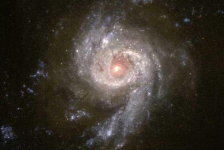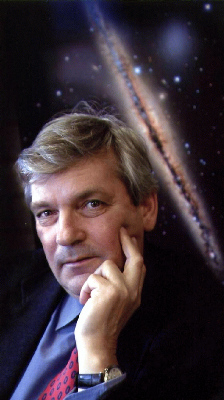

An academic career is full of challenges, in research, in teaching and in administration. Scientific research is challenging in itself; there is the unending adaption of insight to new observations, new ideas, new techniques and a permanent shift of paradigms. There is also the challenge to communicate the new developments to a broad audience and policy makers and to incorporate it in the academic curriculum and lectures. Finally there is the challenge to develop and realise new facilities, scientifically as well as technically, financially and politically.
The meeting is aimed at a broad audience, such as the members of the Koninklijk Natuurkundig Genootschap te Groningen (KNG) and faculty members of the university in other fields of science. It is also expected that it will be attended by Piet's colleagues; those from the Kapteyn Astronomical Institute --of which he has been director for more than ten years-- and other astronomical institutes, but also those colleagues that he worked with on the various boards he served on or still is serving on (see Piet's homepage for a curriculum vitae and more information on his career). The symposium is held under the joint auspices of the Kapteyn Astronomical Institute and the Koninklijk Natuurkundig Genootschap.

The program consists of three parts.
- In the first part there are four presentations of one half-hour by two of Piet's former Ph.D. students and by two of his closest collaborators. The speakers are being asked to describe in the first half of their presentation what they feel has been the most profound discovery, progress or idea that has emerged in astronomy over the last few (say five to ten) years. Then in the second part these speakers should describe what they feel is the most important challenge in astronomical research in the coming years (say also five or ten).
- The second part concerns new faciltities that are at present envisaged, under development or under construction and in which the Netherlands participates in one way or the other. There will be six presentations, also of one half-hour. The speakers are requested to spend approximately one-third of their time on a brief introduction to the facility, one-third on the current status and one-third on what they feel is the most profound challenge in the development of astronomy that this facility will trigger or bring about.
- The symposium will end with a closing talk by Piet, who has been appointed per September 1 as "professor honorair", continuing as distinguished Jacobus C. Kapteyn professor of astronomy.
Program
- Organised jointly by the Kapteyn Astronomical Institute, University of Groningen and the Koninklijk Natuurkundig Genootschap te Groningen.
- The venue is the Main Auditorium ('Aula') in the Academy Building of the University of Groningen (Broerstraat 5) and the date October 12, 2009.
- The language will be English, except probably for parts of Piet's final address.
| Speakers will be introduced by Eline Tolstoy (Kapteyn Astronomical Institute). | |||
| 9:00 | Opening | Lou de Leij | Vice-chairman KNG |
| 9:15 | Challenges | Richard de Grijs | University of Sheffield & Kavli Institute for Astronomy and Astrophysics, Peking University |
| 9:45 | Challenges | Roelof de Jong | Astrophysikalisches Institut, Potsdam |
| 10:15 | Challenges | Ron Allen | Space Telescope Science Institute, Baltimore |
| 10:45 | Coffee/tea | ||
| 11:15 | Challenges | Ken Freeman | Mount Stromlo Observatory, Canberra |
| 11:45 | LOFAR | Ger de Bruyn | ASTRON and Kapteyn Astronomical Institute |
| 12:15 | Herschel | Peter Barthel | Kapteyn Astronomical Institute |
| 12:45 | Lunch | ||
| 13:45 | ALMA | Ewine van Dishoeck | Leiden Observatory |
| 14:15 | JWST | Marijn Franx | Leiden Observatory |
| 14:45 | E-ELT | Tim de Zeeuw | European Southern Observatory |
| 15:15 | SKA | Thijs van der Hulst | Kapteyn Astronomical Institute |
| 15:45 | Coffee/tea | ||
| 16:15 | Challenges | Piet van der Kruit | Jacobus C. Kapteyn Professor |
| 17:00 | Closing and reception | ||